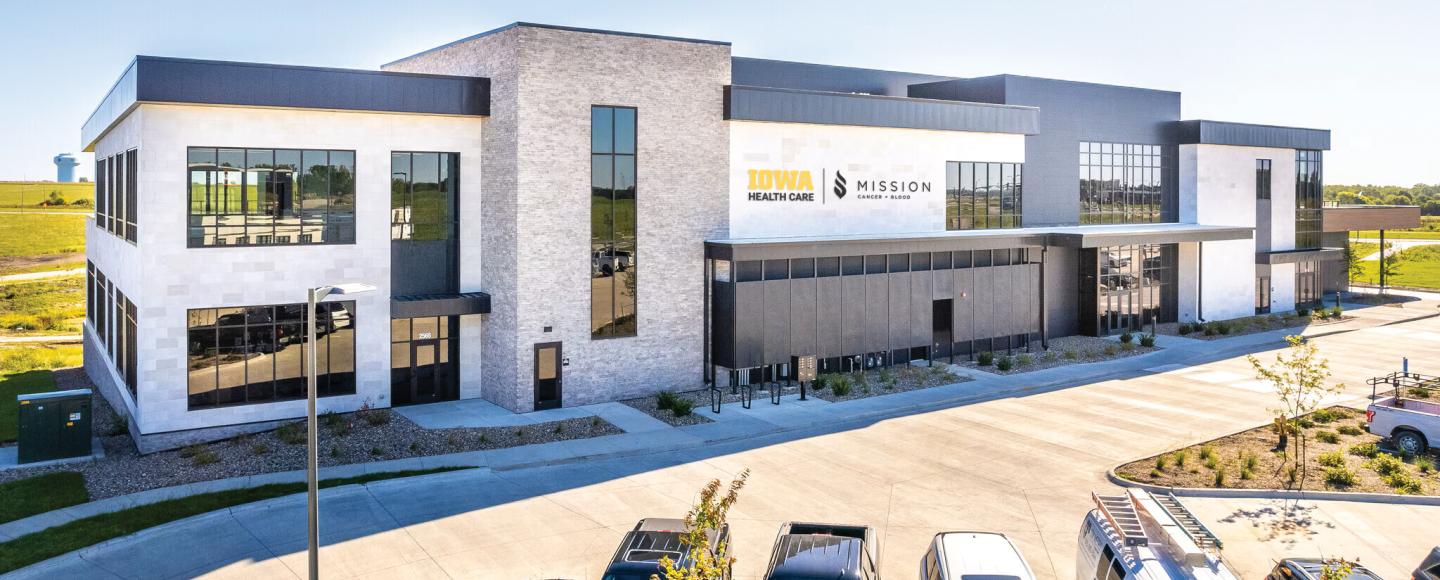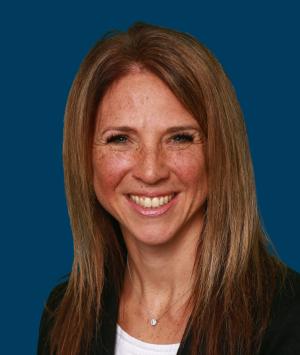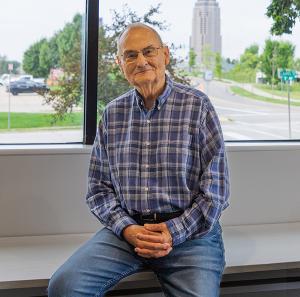Table of ContentsClose

At the start of this year, the Des Moines-based Mission Cancer + Blood officially became part of University of Iowa Health Care, thereby establishing a comprehensive and statewide care network uniquely positioned to address the state’s elevated cancer rates.
Iowa has the second-highest age-adjusted rate of new cancers diagnosed, according to the latest Cancer in Iowa report from the Iowa Cancer Registry, which estimates that 21,200 Iowans will be diagnosed with cancer in 2025.
For more than four decades, Mission Cancer + Blood has provided high-quality oncology services at over 20 locations across the state, primarily in central and western Iowa.
By joining UI Health Care, and in collaboration with the National Cancer Institute-designated Holden Comprehensive Cancer Center at the UI, patients will have greater access to a full range of cancer services, notes Mission CEO Phil Stover, JD, MBA.
“Addressing Iowa’s cancer rates requires collaboration across the state and pooling of resources,” Stover says. “Both organizations realized we could do more together. We can provide more patients with access to comprehensive services, shortened time between diagnosis and treatment for rare and difficult cancers, and expanded options for the latest therapies. This is the right thing to do for Iowans.”
Denise Jamieson, MD, MPH, UI vice president for medical affairs and dean of the Carver College of Medicine, calls it “a turning point” in the Iowa’s cancer treatment efforts.
“By adding Mission to our growing system of care, we are better positioned to collaborate with health systems across the state and critical access hospitals in central Iowa,” Jamieson says. “We intend to build on Mission’s strong, long-standing, and trusted partnerships to bring the highest quality cancer care closer to home for all Iowans.”
Broadening access to clinical trials
For years, Mission has led its own successful cancer clinical trials program. Now, as part of UI Health Care, they’re poised to bring even more emerging cancer treatments and clinical trials closer to patients across the state.
Following its implementation of the electronic health system used at UI Health Care, the organizations launched a first set of joint clinical trials in July. The first two studies are interventional drug treatment trials for patients with large-cell lymphoma. More clinical trials are planned to begin in the coming months for patients with other types of lymphoma as well as multiple myeloma, lung cancer, and breast cancer.
Additionally, three clinical trials are already underway at UI Health Care that will expand to Mission by early fall — one for non-small cell lung cancer and two for lymphoma. There is also a breast cancer clinical trial currently at Mission that will expand to UI Health Care.

These launches marked important steps in sharing expertise and resources, notes Tara Graff, DO, MS, who leads the cellular therapy and clinical trials programs at Mission.
“We’ve been able to make a lot of progress,” Graff says. “Mission and UI Health Care each have had robust clinical trials program for years, and we’ve found ways to share information and align resources that ultimately will make clinical trials more accessible and more convenient for patients.”
The trials originate from a variety of sources: university research programs or consortiums supported by federally funded research grants; biomedical and pharmaceutical companies; and individual investigators in academic medicine or private industry.
Requests and details are funneled to clinical trial coordinators — one at UI Health Care and one at Mission — who work together to evaluate and determine which trials might work at both locations. Key considerations include the novelty of a trial and whether similar studies are already underway. Another factor is the current patient population and whether an adequate number of patients live in the community or region.
Moving forward, UI Health Care and Mission teams are working to build flexible processes for how joint clinical trials will operate. If patients living closer to the Des Moines area are determined to be good candidates for a trial based at the UI for example, it may be possible for Mission to function as a satellite location.
Ultimately, offering clinical trials at joint locations will provide more options for patients while also strengthening the research by providing a larger and broader pool of participants.
“We’re working to minimize or eliminate barriers to clinical trial participation so that patients have access to even more new and emerging therapies closer to where they live,” Graff says.
Expert cancer care, close to home

Every other week, Ron Fisher makes the one-hour trip from his home in Marshalltown, Iowa, to Mission Cancer + Blood in Des Moines, part of UI Health Care, to receive treatment for non-Hodgkin lymphoma.
“I walk in. I get my blood checked, and sometimes they’ll take a scan. I get a shot in the tummy area, and I go home until the next time,” Fisher says about his Mission Cancer + Blood visits. “It takes about 15 minutes. And that’s it.”
The 81-year-old is a longtime cancer survivor — Fisher was first diagnosed and treated in 1994 — whose lymphoma has returned several times over the years. The drug he currently receives, epcoritamab-bysp (brand name: Epkinly), is a relatively new treatment known as a bispecific antibody. It links to healthy T cell-mediated therapies available at Misson Cancer + Blood. Epkinly is one of many T-cell mediated therapies available at Mission Cancer + Blood.
Fisher has recurrent large B cell lymphoma, which is a common but aggressive and fast-growing type of non-Hodgkin lymphoma, and recurrent follicular lymphoma, which is a slow-growing form of non-Hodgkin lymphoma.
Fisher receives Epkinly as a standard of care, as it is approved for third-line diffuse large B cell lymphoma. The U.S. Food and Drug Administration approved the drug for follicular lymphoma in June 2024.
For Fisher, who has received the injections over the past year, the biweekly treatment regimen is a welcome departure from previous therapies involving chemotherapy and radiation.
“I know it sounds like I’m making this up,” he says, “but they give you the shot and you go home. None of this long-term infusion — I’ve been through months of chemo, and I’d had it with that protocol. Besides, it was no longer working. Now, I have no nausea. I may get a little tired for a day or two after getting the shot, but overall, I’ve fared very well.
After three decades living with cancer, Fisher has come to trust the process and his care team.
“The people [at Mission] are so congenial and easy to work with,” he says. “Dr. Graff is so knowledgeable, and she communicates with me. A lot of people deal with [cancer] out of fear, and I’m not afraid of it, so we can get right to it.”
Interested in clinical trials?
All UI Health Care and Mission Cancer + Blood clinical trials are posted online for patients and providers to learn what is currently available. Patients who think they may be a candidate for participation are encouraged to talk to their oncologist about whether they meet the eligibility guidelines. Patients are also welcome to call the Holden Comprehensive Cancer Center Clinical Trials Hotline at 319-353-8155 or email the Mission team at trials@missioncancer.com for more information.
